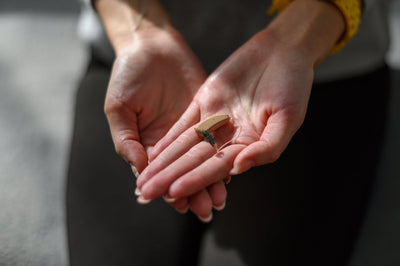Tips for Drivers Who Wear Hearing Aids
Hearing loss is among the most common health conditions of adults (especially older adults) in the United States. When left unaddressed, this can be a safety issue in various situations, including when people with hearing impairment are driving.
Understanding how hearing affects one’s driving ability is crucial in maintaining safety on the road. Yes, eyesight might be the primary sense used for driving, but hearing is just as important. The risk for people with hearing loss is elevated when you combine it with other distractions like blaring noise like horns and sirens from other vehicles on the road.
It is recommended that people with hearing impairment wear hearing aids while driving to significantly improve their ability to hear.
If you are new to wearing hearing aids or you intend to get affordable hearing devices soon, read on as HearGlow shares some tips for drivers who wear hearing aids:
Avoid Distractions
While driving is a great way to have some quality time with yourself, be sure to put safety first. If you have passengers and they are talking to you, try to focus on the road only. Do not let yourself be distracted by jokes and conversations. Avoid using your phone or tablet while driving, too.
Don’t Listen to Music or At Least Lower the Volume
If you love listening to music, it is best to avoid it while you are driving or at least make sure that the volume is at a tolerable level. It is not only distracting but also bad for your hearing health.
Be Aware of Your Surroundings at All Times
While you are driving, be sure to be aware of your surroundings at all times, as this will help you to read the body language of other drivers and pedestrians. You need to be mindful of other drivers making signals and, of course, don't forget to watch street signs and traffic lights.
Always Wear Your Hearing Aids
Wearing a hearing aid is very crucial for people with hearing impairment. Not wearing these hearing aids can make you lose essential sounds that you need to be aware of. For example, you will probably not hear the sounds of other vehicles on the road. This can cause you to be in danger. If you are not wearing a hearing aid, it is best to ask a friend or a family member to be your driver.
Get Your Hearing Assessed Regularly
If you were born with a hearing impairment, or your hearing has been going bad in recent years, you should get your hearing assessed regularly. Aside from helping you determine if your hearing loss is worsening, a hearing screening test will also help your doctor decide whether or not you need to get a hearing aid. If you already have a hearing aid, it is best to get both your hearing and your hearing aids checked every year to make sure that your device is still working well for you.
Conclusion
Driving is a must for most people in the country, but with hearing loss affecting so many people, it is essential to keep your hearing health in check, especially if you have been noticing signs that your hearing health is not as good as it used to be. Do not let yourself be a safety hazard not only for yourself but also for everyone on the road because you are not wearing a hearing aid or don’t have your hearing checked regularly.
The good news is that there are high-quality yet affordable hearing aids that you can get to ensure that you can hear well all the time, and especially when you’re driving.
HearGlow offers affordable hearing devices that are suitable for mild to moderately severe hearing loss. Check out our discreet hearing aids today!
Related Articles



